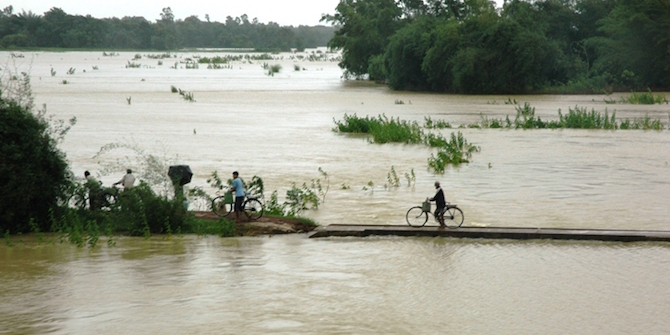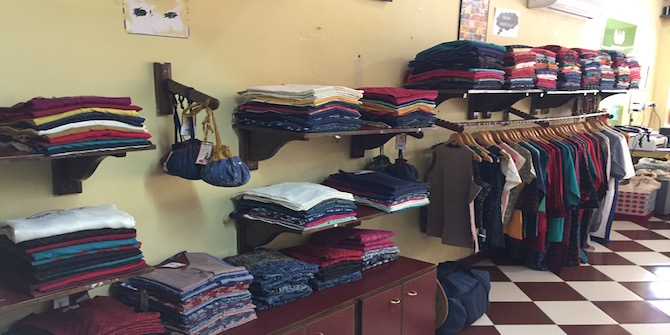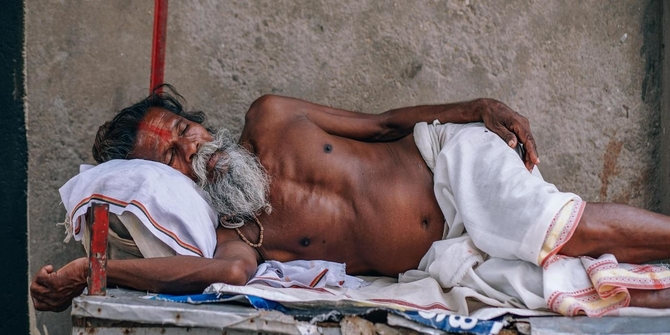LSE’s Dr Manali Desai (Department of Sociology) along with Dr Indrajit Roy (Research Fellow at Queen Elizabeth House, University of Oxford) recently conducted interviews across several communities in Ahmedabad, Gujarat, as part of the Leverhulme research project Beyond Identity? Markets and Logics of Democratisation in India, 1991-Present. The interviews reveal the contested and ambivalent character of political subjectivities among certain communities in the state, raising questions about narratives of Hindutva in Gujarat.
Our recent research consisted of up to 50 in-depth interviews across two generations of men and women specifically from Dalit, Other Backward Class (OBC) and Muslim communities. The research aimed to understand how political subjectivities – the ensemble of beliefs through which individuals interpret and respond to their position within society – have shifted across two generations: those born during the 1950s and 1960s, and those born during the 1980s. This part of the project thus captured a period of major political and social transformation in the context of two decades of neoliberal reforms.
The research revealed the fractured, contested and ambivalent character of political subjectivity among our interviewees, which led us to question the mythologies that have become pervasive in popular and academic treatments of Hindutva in Gujarat. The recent and third electoral victory of Narendra Modi as Chief Minister of Gujarat has intensified the myth-making that is partly his style of politics and partly a product of the media frenzy over his future. The BJP’s ability to defy anti-incumbency and trounce the Congress repeatedly in elections has led to a view among supporters that Hindutva has successfully tapped the political imagination and energies of communities well outside the middle classes. The BJP claims that the people of Gujarat support Modi because of the development he has brought to the state.
Yet numerous studies show that social development in Gujarat lags behind many states, and the benefits of development have not reached beyond the middle classes. The paradox of why people vote for parties/ideologies when it is against their interests to do so is, then, nowhere more evident than in urban Gujarat where poor Dalits and OBCs vote for the BJP despite its cultural and political affinities with the upper castes. In a society where caste hierarchies and exclusion are so prominent, why does the BJP not face greater resistance from the lower castes?
A political subjectivity lens provides some answers. Political subjectivities have a much longer-term orientation than the time frame of political polls and voting studies. The problems of accuracy that plague exit polls, surprise victories (e.g. Congress-led UPA victory in 2004 and 2009) as well as unpredictable anti- versus pro-incumbency voting have occupied a lot of analytical space of late. The puzzle deepens when we consider that voting turnout in Gujarat in the December 2012 elections reached 71 per cent, suggesting that the vote is a dearly held democratic right. Nevertheless, our research suggests that we need to pay greater attention to the underlying orientations, disappointments and despondent subjectivities of those who are left out of the liberalisation process.
Many of our interviews were conducted during the 2012 elections, and we noted widespread cynicism about politics itself, which appears to contradict the high turnout. Thus reading the vote as signifying something about political subjectivity is fraught with problems. Instead, people voted for reasons that were not easily reducible to standard variables or interests. Our interviewees cited a number of reasons for voting for particular parties, most of them involving decisions made as families, communities, and neighbourhoods rather than as individuals.
Our preliminary findings show three important factors for the support for Modi among constituencies that one might have expected to oppose him:
The social engineering of consensus around the promise and premise of development. Gujarat’s roads are certainly better than those other Indian states, there are several spaces for the leisure of its ‘neo-middle’ class, and there is little doubt that the availability of potable drinking water and electricity is taken for granted in most areas and colonies of Ahmedabad, a feat unmatched even in the national capital. Although human development indicators are far more pessimistic, our respondents were convinced that Gujarat was indeed more ‘developed’ than the rest of India.
However – and this was crucial – when discussions turned to the specific ways in which they may have benefited from development, there was considerable ambivalence. Most importantly, our interviewees lamented the casualisation and informalisation of the labour market and shrinking employment opportunities. These economic insecurities were voiced by a cross-section of families. A 50-year old OBC Hindu autorickshaw-driver who ferried one of us from Khadia to Vejalpur spoke about his retrenchment two decades ago from one of the city’s several textile mills, a sector that had until three decades ago been a primary source of employment for two-thirds of city’s working population; he took to driving the autorickshaw soon thereafter. His earnings, although not insubstantial, are characterised by insecurity. Similarly, a 35-year old Dalit Hindu retailer of ‘fancy clothes’ who had been recently shifted from the Sabarmati Riverbank to make way for the beautification of the river front to a rehabilitation colony in Vatva, referred to a limited market for his wares in his new surroundings, given that everyone else there was, like him, “dumped from the city to make way for the pleasure of the wealthy.” A 25-year old Rabari Hindu man in Shahpur talked sullenly about his inability to land a job, which he linked to his inability to continue his education. His community is associated with tending livestock, a skill that offers him neither monetary renumeration nor the “ability”- as he puts it- to obtain a college degree.
Despite these insecurities, all three individuals are fiercely supportive of Modi on grounds that he has “developed” Gujarat, and assert that they too have benefitted from it. The success of the Modi regime in constructing a shared political identity around development, while decoupling it from employment security, is by far an important contributor to his successful recruitment of subaltern social groups to his electoral fortunes.
Other reasons for Modi’s success are the perception that the security environment in Ahmedabad has improved, and the sense among Dalits and OBCs that the BJP (Modi in particular) has offered them respect and opportunities for integration into upper caste society. For a detailed discussion of these reasons, click here for Part 2 of this post.









Nice and interesting research. Some of my friends who have been traveling in Gujarat say that Modi has developed the state a lot in the past decade. However, I have few questions:
1. What was the percentage of middle-class people (irrespective of caste) before Modi compared to present numbers in Gujarat?
2. What is the percentage of malnutrition in Gujarat? This was a talking point in the media a few months ago and it seems malnutrition has reduced significantly under Modi.
3. What job prospects are there for youngsters in Gujarat?